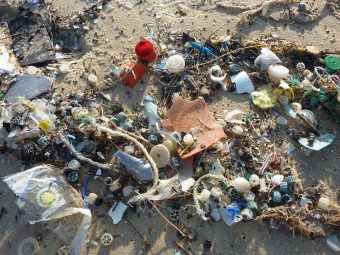
Prime Minister Theresa May has pledged £61.4m in funding to turn the tide against ocean plastic, as part of a new initiative from Commonwealth countries to tackle the problem.
Announcing the move on Saturday, May dubbed plastic waste a “scourge” on the world’s oceans and promised to harness collective action from Commonwealth nations to “effect real change”.
The cash will be split into three pots: £25m into scientific, economic and social research to address sources of plastic waste, £20m to stop plastic pollution from manufacturing in developing countries, and £16.4m to improve waste management in the UK, particularly in cities.
The PM will use a meeting of the 52 Commonwealth nations in London today to urge other countries to join the anti-plastic fight, under a new campaign from the UK and island state Vanuatu dubbed the Commonwealth Clean Oceans Alliance (CCOA).
May hopes other Commonwealth nations will join the CCOA and follow in the footsteps of the UK on tackling plastic waste, by implementing measures such as a microbeads ban or plastic bag charges. New Zealand, Sri Lanka and Ghana have already joined, Downing Street said on Saturday.
“This week we will look closely at how we can tackle the many threats to the health of the world’s oceans, including the scourge of marine plastic pollution,” she said in advance of the summit this week.
“As one of the most significant environmental challenges facing the world today it is vital that we tackle this issue, so that future generations can enjoy a natural environment that is healthier than we currently find it.”
Poor waste management is the single leading cause of plastics in the ocean, and improving waste infrastructure in developing countries will be a major focus of the CCOA, according to Downing Street.
For example, the Department for International Development will fund pilot programmes in up to three Commonwealth developing countries to tackle waste from cities that often ends up in waterways.
Earlier this year the UK promised to eliminate “unnecessary” single-use plastics in the UK by 2042. The pledge came in response to an unprecedented public outcry over the issue following the broadcast of the BBC’s Blue Planet II documentary, which exposed the devastating impact plastic waste is having on ocean wildlife, and high-profile campaigns such as Sky’s Ocean Rescue initiative.
Although measures to hike taxes on single-use plastics are still under development, the response from the business world to anti-plastic sentiment has been dramatic, with firms from PG Tips to Iceland pledging to cut down – or outlaw altogether – single-use plastics from their operations.
Meanwhile, campaigners show no signs of easing up on the issue. Today Sky announced National Geographic has pledged $10m towards the broadcaster’s Sky Ocean Ventures, an investment arm dedicated to supporting business ideas to tackle ocean plastic.
The cash will be used for grants, innovation challenges and events to raise the profile of the plastic problem and fund the development of alternative materials and new, zero-waste manufacturing processes.
Source: businessgreen.com

